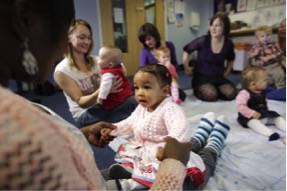Training practitioners and working with families to support children’s early learning.
What are the goals of the work?
How does it fit into the ethos of PEEPLE (PEEP – Parents Early Education Partnership)?
The charity PEEPLE [ http://www.peeple.org.uk ] seeks to enable parents/carers, babies and children to learn together. It was established in 1995 in Oxford with the initial intention of improving the literacy skills of children in the local community. The Headteacher of Peers Secondary School, Bernard Clarke, worked with a governor to devise a project based on learning from birth with families, rather than conceiving a remedial programme. From the outset, the CEO Rosemary Roberts worked with Dr Alison Street (an early childhood music specialist) to develop the Learning Together programme in which music is a central medium for communication, bringing people together and understanding relationships.

How does it fit into the learning strategy of PEEPLE?
The PEEP Learning Together Programme is a key evidence-based programme produced by PEEPLE for parent support [ http://www.peeple.org.uk/ltp ] that is designed to allow parents and carers to improve their children's life chances, by making the most of everyday learning opportunities – listening, talking, playing, singing and sharing books and stories together.
Music is a key means by which people understand each other and, therefore, is very powerful for communication, language and literacy and emotional expressiveness. Adults engage with babies and young children through musical playfulness and activities. These can be both playful and soothing. PEEPLE supports parents and carers as children's first educators and sees its role as recognising and build on parents' existing skills in order to make learning effective. Music has always been an integral part of this vision.
How does it fit into the curriculum of PEEPLE?
The Learning Together Programme (LTP) is a programme that contains 74 topics grouped together in 5 strands:
- PSED Personal social and emotional development
- CL Communication and Language
- EL Early literacy
- EM Early maths
- HPD Health and physical development
Musical ideas are threaded throughout the 74 topics, such as for example in Communication and Language where there are the following topics: Musical moments, making sense of sounds, becoming a good listener and imaginative play with puppets. The topics have session plans and within the plans there are suggested songs, rhymes and musical activities. Information from the topics about music is shared through handouts for parents, in topic cards and the toolbox for practitioners.
Songs, rhymes and movement activities are part of every PEEP session, which also includes talking time with parents/carers, sharing a book and practical activities. The talking time with parents is structured and guided by either a question related to the topic (e.g. musical moments), or a provocation in terms of a statement or an activity (e.g. making shakers and talking about the benefits). The topic for talk time may also be generated by the parents.
What outcomes are being explicitly targeted?
The main outcome is for parents/carers to engage with their children more purposefully, more meaning fully, and more frequently. Various studies, including the Birth to Schools study (Evangelou et al., 2005) [ http://www.peeple.org.uk/bts-study ], EPPE (2003), and Enabling parents (Sylva et al., 2004) [ http://www.peeple.org.uk/content/enabling-parents-study ], have suggested that central to learning is the quality of the relationship between parents and children and the quality of the home learning environment, regardless of socio-economic background, wealth or educational attainment of parents.
What is the context of the work?
The Learning Together Programme (LTP) is offered across a range of community settings, such as Pre-School settings, Stay and Play parent-child groups, one-to-one home setting, Ante-natal health clinics, and informal settings, such as swimming pools, parks, and parent groups for children with special educational needs.
The Learning Together programme (LTP) [ http://www.peeple.org.uk/what-is-ltp ] works with parents/ carers with their children from birth and before birth – 5 years, and is a nationwide programme. Peeple is active in every local authority throughout the UK.
It has been embedded in long–term planning since its inception in 1995. It is used in Scotland as part of strategic parent-support programme (see: http://www.peeple.org.uk/content/Scotland )
Trained PEEP practitioners lead the work in the community (see http://www.peeple.org.uk/training ). These are not specialist music practitioners, but individuals who have either been through the programme as a parent and taken more and more training in order to lead sessions, or practitioners from a diverse range of professional early childhood backgrounds who wish to work together with families using the PEEP approach. Participants receive training in how to lead effective musical activities as part of their training.
What is the content of the work?
The content of the work embraces:
- Fostering musicality from birth – using songs, rhymes and voice play and rhythmic speech patterns to promote interaction and engagement between carers and their babies;
- Recognising the importance of singing with young children. Singing is used to help parents and children understand more about each other's feelings. It can be a source to relieve parents' own perceptions of stress and provides an opportunity to pass on well-known stories, drawing upon memories of places and people. There are songs for play, for helping babies to sleep, for understanding about the world and customs and expectations of family roles. (see http://www.peeple.org.uk/content/singing-together-cds-songbooks );
- Music in culturally diverse contexts – Practitioners explore with parents the music of their own culture, and their storytelling and song singing become important learning resources with their children and others.
What are the key features of the teaching and learning approach?
The work is underpinned by the ORIM framework (Hannon and Nutbrown, 1995 Literacy, Home and School, The Falmer Press – see below). This is a 'theory of change' programme that can be seen as an adult education programme (training for practitioners and for parents), as well as a useful framework for parents to use at home with their children. It is also a useful framework for practice.
The ORIM framework embraces:
- Opportunities – Practitioners and parents offer day-to-day opportunities for children to learn;
- Recognition – By acknowledge existing parental skills in supporting their child' s learning practitioners offer further opportunities to extend and develop what has already been identified. Parents recognise their children's strengths, curiosities and interests;
- Interaction – Songs and Rhymes provide playful and expressive opportunities for engagement and communication - highlighting the importance of interaction; and
- Modelling – This operates on many levels. Parents are examples for their children, practitioners can be examples for the parents and parents model to each other and back to practitioners. It is a circular process.
How is the work being reviewed?
The evidence base for the effectiveness of the initiative comes from five independent research studies by Universities of Oxford and Warwick (for more information please see: http://www.peeple.org.uk/research ).
What are the positive outcomes for children/young people?
Findings from the research studies suggest that:
- Children who had attended PEEP groups were thought by their teachers, on entering school, to be good listeners and engaged in their learning. They were able to concentrate and could recognise their letters and sounds; and
- Children who attended PEEP groups knew more songs; they were used to making things with their parents and peers, and they were curious about learning.
What are the key features of teacher/leader behaviour that are enabling those positive outcomes?
Practitioners know a lot about the framework (ORIM) and they have received PEEP training. They use the PEEPLE principles to guide their work. The underpinning framework is used to guide effective practice.
What are the key features of context, content and activities that are enabling those positive outcomes?
All activities are based on the ORIM framework and the practitioner has to be a flexible facilitator to act in the best interests of the parents/carers and children with whom they are working. Songs, rhymes and musical activities are based on a repertoire which has guidance for parents about what to do, day-to-day, with children. Some songs overtly reinforce the relationship between the dyad and a sense of belonging. Others are about playful situations, early maths, early literacy and intimacy between the pair.
How replicable or adaptable is it?
The learning opportunities that are offered in the LTP are based on everyday situations which are themselves learning opportunities. What is important is the role of the practitioner who understands and extends those opportunities using known songs and other musical resources to support parents and children to learn together.
